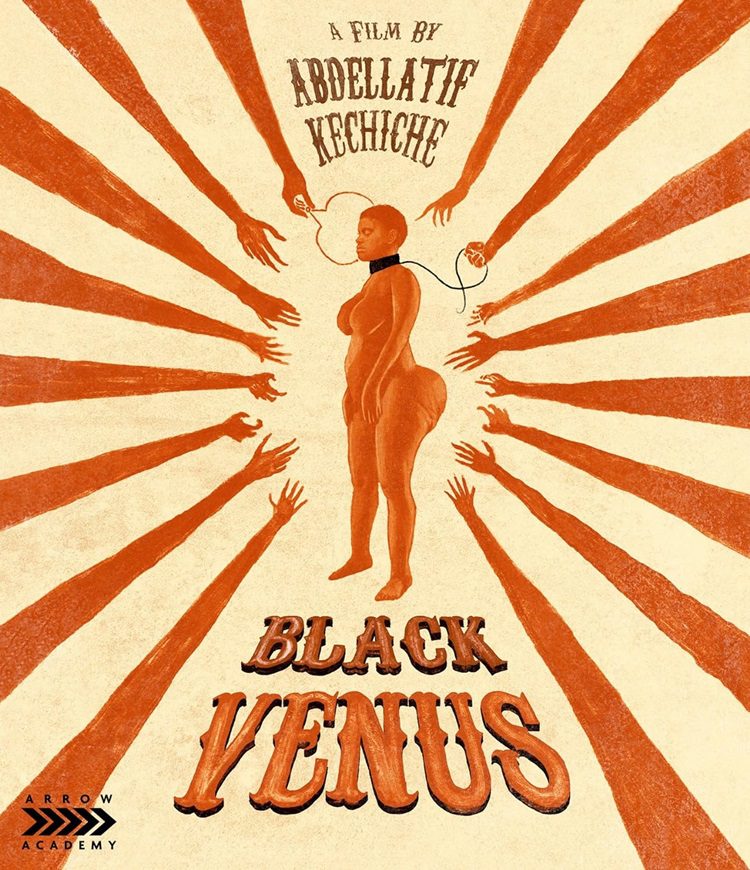
Black Venus tells the true life story of Sarah “Saartjie” Baartman, a South African woman who was mistreated her entire life due to her large buttocks and genitals. Though not technically a slave, she lived like one for several years in Captetown serving as a washwoman and nursemaid to the Caezar family. Eventually, Hendrik Caezar and his friend William Dunlop took Sarah to England and France where they exhibited her in a freak show like a wild animal. She was put into a cage, dressed like a stereotypical native, laughed and scoffed at by the rabble who poked and prodded her as they wished. French scientists studied her and used her as an exhibit for their racist ideas which held sway at the time. She died in abject poverty living as a prostitute.
The film documents her life in London and Paris. We first see her performing before a crowd in London. She is brought out in a cage, whipped and chained like an animal. Caezar leads her around the room as she growls and lunges as if she was feral. She dances and shakes her hind quarters. In the end, the crowd is encouraged to touch her bottom. It is a long scene, one that will be played out several more times in the course of the movie, each more indecent than the other, dwelling painstakingly on the humiliations and suffering of Sarah.
At the end of the shows, she takes off her “tribal” garments and begins to drink. We see on her face how she suffers. Within minutes, Caezar comes in looking triumphant and says they are going to do another show. He is an abuser extraordinaire. One moment, he is talking sweet to her, telling her how much money they are going to make. The next, he’s shouting at her, threatening her with violence if she doesn’t behave.
Abolitionists in London take Caezar and Dunlap to court believing her to be a slave, but Sarah declares herself to be free and performing under her own will and the case is dropped. The film does not explicitly state that she did this under coercion but there can be little doubt. The abolitionists seem only to care about their fight and not so much about Sarah as a person.
In Paris, there is no such concern and her act is taken to even more extremes. By the end of one private gathering, Sarah is forced to lay down and allow the supposed high-class audience to grope her genitals. Later, she is asked to pose for a group of scientists who are perturbed that she will not remove all of her clothing to expose her sex organs to their measuring and drawing. A journalist interviews her, but seems disappointed that she does not come from tribal royalty and that her family did not die because of white slavers. Every person she interacts with treats her as an object or some “other” for which to create social change, but not as a real human being.
Black Venus is an important film. It documents a dark part of our history that should be known to a greater audience. It is a good film. It is well made and the acting is uniformly good. It is a difficult film to watch and that is not always for the better. For three hours, we see Sarah abused, tortured, raped, and treated like a wild animal but she is never given any agency. She barely speaks at all, and we are never given any indication of her internal life. Yahima Torres does a fine job of showing the sadness behind her eyes but isn’t given much to work with. While the parts of her life we are shown are horrendous and thus, there should be no expectation for her to laugh and play or dance like a trained monkey, but without any aspect of her life outside of her enslavement, without any indication of who she actually was, it is difficult to relate to her.
I don’t want to call this torture porn, as it is too important for that low distinction, but it’s not all that far from it either. Movies like Saw and Hostel feed us a certain visceral thrill from extreme violence. Black Venus doesn’t thrill so much as it allows us to feel smug over how much we’ve progressed from those days. It is a moving film, and again, one that depicts something important but by not giving Sarah any sort of life off her own I can’t help but feel the film in some ways is using her yet again.
Arrow Academy’s Blu-ray transfer looks very good. It is a very dark film shot mostly in low light amongst the shadows, but I could always see what was happening. The color is dingy but expressed quite beautifully. Audio likewise is quite good. There is no music outside of the occasional playing by characters but what is there comes in well. There is a lot of rabble rousing which makes use of all channels. Spoken word is mostly in French with some Dutch, Afrikaan, and English as well. The subtitles have the annoying habit of disappearing when English is spoken as if the only reason to have them is a lack of fluency in non-English languages. There is a lot of low talking throughout the film and I had a very hard time understanding it without those subtitles. Extras include an appreciation of the film by critic Neil Young, trailers, and the usual Arrow booklet full of photos and an essay.
Black Venus is a well made film depicting an important part of our history. I just wish it had allowed us to see more of who Sarah was beyond behind the victim of horrendous abuse.